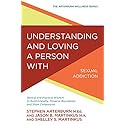Rather than identify this struggle as sex addiction, I prefer to use the term sexual addiction. I believe this is more fitting. Sexual addiction means using some aspect(s) of our sexual nature in a compulsive, mood-altering, life-disrupting way. In addition, I prefer to use the language struggling with sexual addiction or struggling with sexual integrity issues rather than sex addict or sexual addict. The reason has to do with identity. Labels and categories like addict can become one’s identity. Yet, as followers of Jesus, our identities are rooted in who He is, not what we’ve done.
Sexual Addiction Is Not Just about Sex —It’s About Biology
It is also important for us to understand what sexual addiction is really about. When we broaden the definition from sex to sexual addiction, we give ourselves the opportunity to break from the current paradigm. As it stands, between the nomenclature and the myths created by media and culture, there are a couple of insinuations that miss the heart of the struggle.
We can begin with the myth that someone struggling with sex addiction has a higher—than—normal sex drive. This has its roots in nymphomania—-the idea that someone needs sex very frequently. While the frequency desired might fall outside what is considered normative, it is an issue connected to biology. However, the core of it has more to do with a person’s whole being (mind, heart, body, and soul) than it does with his inherent natural biological order. Let’s look at one facet of the biological aspect.
An Addict’s Brain
Neural chemistry is the primary area where this addiction is biological in nature. When we engage sexually, a host of chemicals are released in the brain: dopamine, epinephrine, adrenaline, serotonin, oxytocin, vasopressin, and endogenous opiates just to name a few. The neurochemical dopamine, along with endogenous opiates, plays an integral role in sexual addiction. Dopamine is responsible for two key functions. First, it drives novelty. It puts our brains on high alert for experiences that are new and exciting. Second, it drives satiation. Dopamine propels us toward feeling satisfied. That feeling of satisfaction is a direct result of opiate activation in the brain. It can be described as a sort of euphoria. It’s the sense of release, relief, and calm that sets in upon ejaculation.
In the brain of someone sexually addicted, both dopamine and opiate activation are out of calibration. The release and reception of the chemicals are out of balance. The by-product is that the brain develops a tolerance to the stimulation, thus developing stronger and more intense sexual cravings. As Steve and company write in Every Young Man’s Battle, we end up with a sumo-sized sex drive.
While someone sexually addicted may desire sex frequently, it is more a function of distorted neural chemistry than natural drive. Further, that distortion leads to the escalation of his addiction. In other words, the acting out gets worse. What characterizes “worse” is unique to each individual. For some, it means the frequency of porn-viewing episodes will increase. Or instead of a regular rhythm of half-hour episodes, it becomes less frequent binges lasting hours each time. Unfortunately, as it pertains to pornography, many people report searching for and viewing things they never imagined getting caught up in. The depth of depravity is endless, and the bounds of available content are scary.
It Can Wreck Lives
For others, the behavior becomes increasingly risky. On one hand, the risk is to their livelihood. They do things that could potentially get them fired from their jobs if they are caught or even guarantee they can never work in the same field again. Their behavior ups the ante to the point where being found out would require moving to an entirely different state. The escalation sometimes moves offline, from pornography to prostitutes or affairs, putting health and physical well–being in jeopardy. This is especially scary for someone married to a sexual addict. Too many wives I talk to are recipients of a sexually transmitted infection. The reality is that some wives are at risk of HIV just due to the bad decisions of their husbands.
Another unfortunate faulty belief is that a person with this affliction walks around like a sex-crazed monster or pervert, always on the prowl for a consenting, or perhaps even nonconsenting, victim. The unintended consequence of this is the vilification of the person struggling. That person then internalizes the message of being a monster, and as we’ll discuss shortly, the message becomes a part of the trap keeping the addicted person ensnared.
It’s Not Just About Getting Physical
Finally, an insinuation that limits our understanding is that sex addiction is merely about the physical act. It, unfortunately, disregards all the emotional impacts of engaging one’s sexuality. For example, feelings like acceptance, peace, belonging, love, value, worth, affirmation, power, and adequacy are woven into the experience of sexual intimacy. Any or all of these can be intoxicating, alluring, and potentially addictive in themselves. Many of the folks I’ve had the privilege of walking with, and even I myself as part of my own addictive journey, have acted out in the form of an emotional experience. As a heroin addict longs for another hit and injects the needle into his arm, so does a sexual addict crave the medicinal and intoxicating feelings associated with sex.
In order to extend grace and love to someone struggling with sexual addiction, we must dismantle what we see and understand at face value.Click To TweetWhat I’m getting at here is that in order to extend grace and love to someone struggling with sexual addiction, we must dismantle what we see and understand at face value. I am convinced that as you delve deeper into the heart and mind of someone struggling, you’ll begin to see him in a different, more compassionate and empathic light.
Understanding and Loving a Person with Sexual Addiction ©2018 by Stephen Arterburn. Used by permission of David C Cook. May not be further reproduced. All rights reserved.




 Stephen “Steve” Arterburn is an author, speaker, counselor, radio talk-show host of New Life Live, host of New Life TV, and founder of New Life Ministries and Women of Faith. He co-wrote Every Man’s Battle: Winning the War on Sexual Temptation One Victory at a Time with Fred Stoeker, as well as several other publications.
Stephen “Steve” Arterburn is an author, speaker, counselor, radio talk-show host of New Life Live, host of New Life TV, and founder of New Life Ministries and Women of Faith. He co-wrote Every Man’s Battle: Winning the War on Sexual Temptation One Victory at a Time with Fred Stoeker, as well as several other publications.









